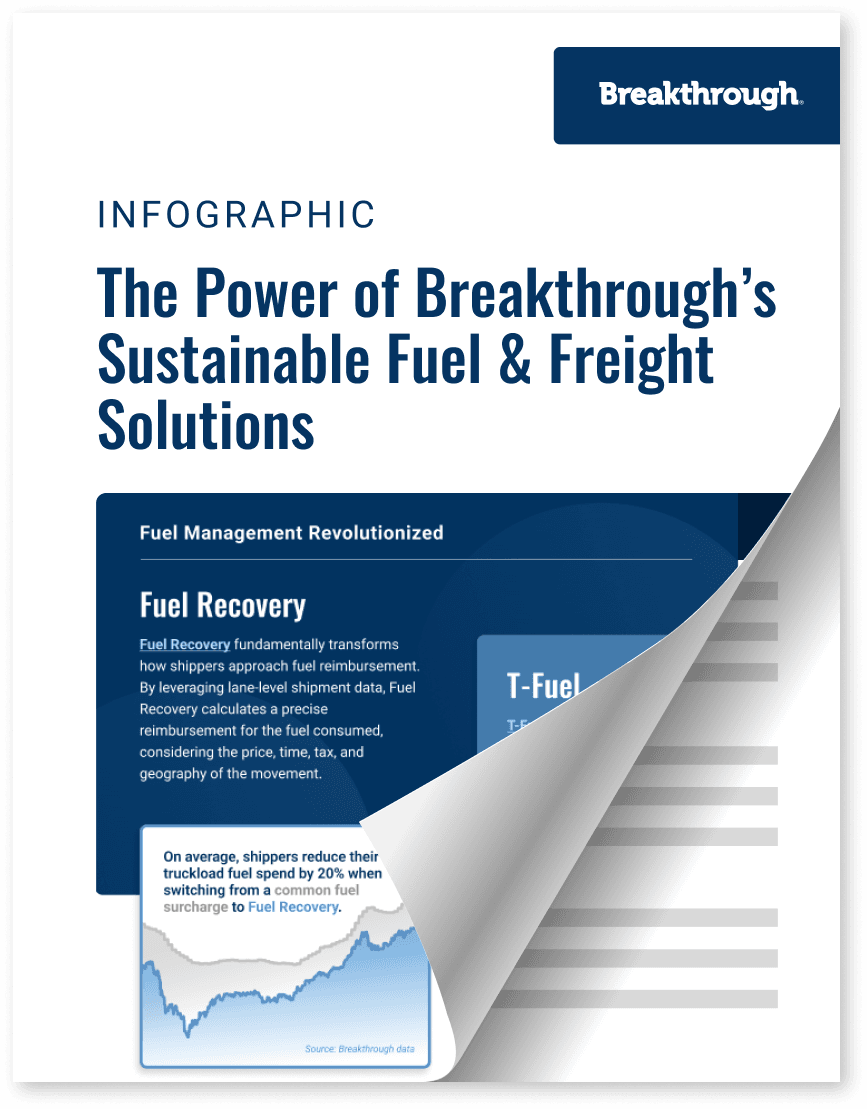The Power of Breakthrough's Sustainable Fuel and Freight Solutions

Freight
3 min read
July 17, 2024
Market Events
4 min read
July 16, 2024
Market Events
3 min read
July 8, 2024

3 min read
November 21, 2023

Share:
Effectively managing fuel costs for transporting goods can pose significant challenges for shippers. Geopolitical and macroeconomic uncertainty can lead to volatile energy markets, making it difficult for a shipper to budget and manage future fuel spend. Shippers can achieve budget certainty, improve cost management, and stabilize profit margins with a risk management plan.
Fuel hedging is commonly used by companies, especially large shippers, to protect themselves from volatile fuel prices. In a market where a single event can cause significant price volatility, like we’ve seen recently in Eastern Europe and the Middle East, it becomes imperative for shippers to efficiently manage their fuel expenditure. In 2023, intraday wholesale price movements greater than or equal to 10 cents occurred 20 times between January 1 and November 6. Before 2022, this had only happened 12 times in 10 years.

2023 Day-Over-Day Wholesale Diesel Price Change
Given the considerable volatility in the fuel market, shippers should consider safeguarding their budgets with a fuel hedging strategy. While implementing a fuel hedging strategy may require some upfront effort, the long-term benefits are well worth it.
A network-specific fuel hedging strategy is valuable for shippers looking to manage their fuel budget. By mitigating the risks associated with volatile fuel prices with a tailored hedging program, shippers can benefit from cost stability and predictability, which can lead to profitability. T-Fuel, a customized risk management tool, helps create budget certainty by enabling a shipper to lock in a fixed wholesale price for the fuel consumed to move goods to market. And with the level of customization that T-Fuel provides, shippers can fine-tune their hedging approach to suit their unique needs and goals, considering regional fuel consumption, percentage of network, and timeframe.
What makes T-Fuel the ideal hedging tool?
Hedging fuel consumption is a highly effective strategy that shippers should consider during their budgeting cycle. By locking in a fixed price for the fuel used to transport their products, they can improve cost management, which ultimately leads to profit margin stability.
T-Fuel seamlessly integrates with a shipper’s existing Fuel Recovery program. By implementing Fuel Recovery and T-Fuel, shippers can capture or hedge up to 85% of their wholesale fuel expenditure, thereby establishing budget certainty, improving cost management, stabilizing profit margins, and ensuring a steady return for shareholders.
Take control of your energy costs with T-Fuel. Schedule time to learn more today and experience budget certainty like never before.

3 min read
July 17, 2024
Maximize transportation efficiency with cohesive fuel and freight strategies. Discover the power of enhanced visibility, cost-effectiveness, and sustainability.
Read more
4 min read
July 16, 2024
Discover how the recent elections in Mexico and the EU are expected to influence energy policies, fuel prices, and dynamics in the transportation sector.
Read more
3 min read
July 8, 2024
Understand the state-specific changes in diesel tax rates and explore strategic solutions for shippers to accurately calculate fuel reimbursements to carriers.
Read more